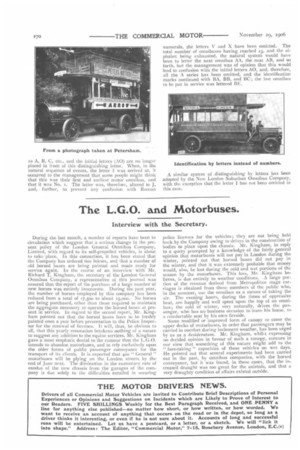The L.G.O. and Motorbuses.
Page 10

If you've noticed an error in this article please click here to report it so we can fix it.
Interview with the Secretary.
During the last month, a number of reports have been in circulation which suggest that a serious change in the present policy of the London General Omnibus Company, Limited, with regard to its self-propelled vehicles, is about to take place. In this connection, it has been stated that the Company has ordered 600 hdrses, and that a number of old horsed buses are being painted and made ready for service again. In the course of an interview with Mr. Richard T. King-hant, the secretaryof the London General Omnibus Company, a representative of this journal was assured that the report of the purchase of a large number of new horses was entirely inaccurate. During the past year, the number of horses employed by this company has been reduced from a total of 17,500 to about 15,o0o. No horses are being purchased, other than those required to maintain the aggregate necessary to operate the horsed buses at present in service. In regard to the second report, Mr. Kingham pointed out that the horsed buses have to be freshly painted once a year before presentation to the Police Inspector for the renewal of licenses. It will, thus, be obvious to all, that this yearly renovation betokens nothing of a nature to suggest any addition to the equine services. Mr. Kingham gave a most emphatic denial to the rumour that the L.G.O. intends to abandon motorbuses, and to rely exclusively upon the older forms of public passenger conveyance for the transport of its clients. It is expected that 400 " General " motorbuses will be plying on the London streets by the end of June next. The diminution in the customary rate of exodus of the new chassis from the garages of the company is due solely to the difficulties entailed in securing police licenses for the vehicles; they are not being held back by the Company owing to delays in the construction of bodies to place upon the chassis. Mr. Kingham, in reply to a query prompted by a knowledge of the fairly general opinion that motorbuses will not pay in London during the winter, pointed out that horsed buses did not pay in the winter, and that it was extremely probable that money would, also, be lost during the cold and wet portions of the season by the motorbuses. This loss, Mr. Kingham believes, is due entirely to weather conditions. A large portion of the revenue derived from Metropolitan stage carriages is obtained from those members of the public who, in the summer, use the omnibus as a means of taking the air. The evening hours, during the times of oppressive heat, are happily and well spent upon the top of an omnibus; the cold of winter, very naturally, drives the passenger, who has no business occasion to leave his home, to a comfortable seat by his own, fireside. Some modified or improved form of canopy to cover the upper decks of motorbuses, in order that passengers may be carried in comfort during inclement weather, has been urged by us as a desideratum. Mr. Kingham, whilst expressing no decided opinion in favour of such a canopy, concurs in our view that something of this nature might add to the "
fare-taking" capacities of these vehicles on wet days. He pointed out that several experiments had been carried out in the past, by omnibus companies, with the horsed conveyance, but it was found, in these cases, that the increased draught was too great for the animals, and that a very draughty condition of affairs existed outside.


























